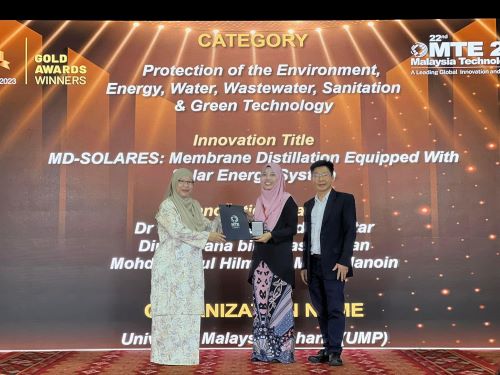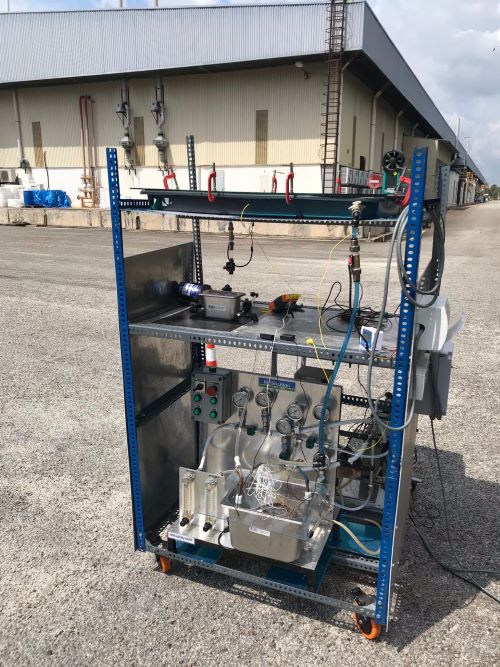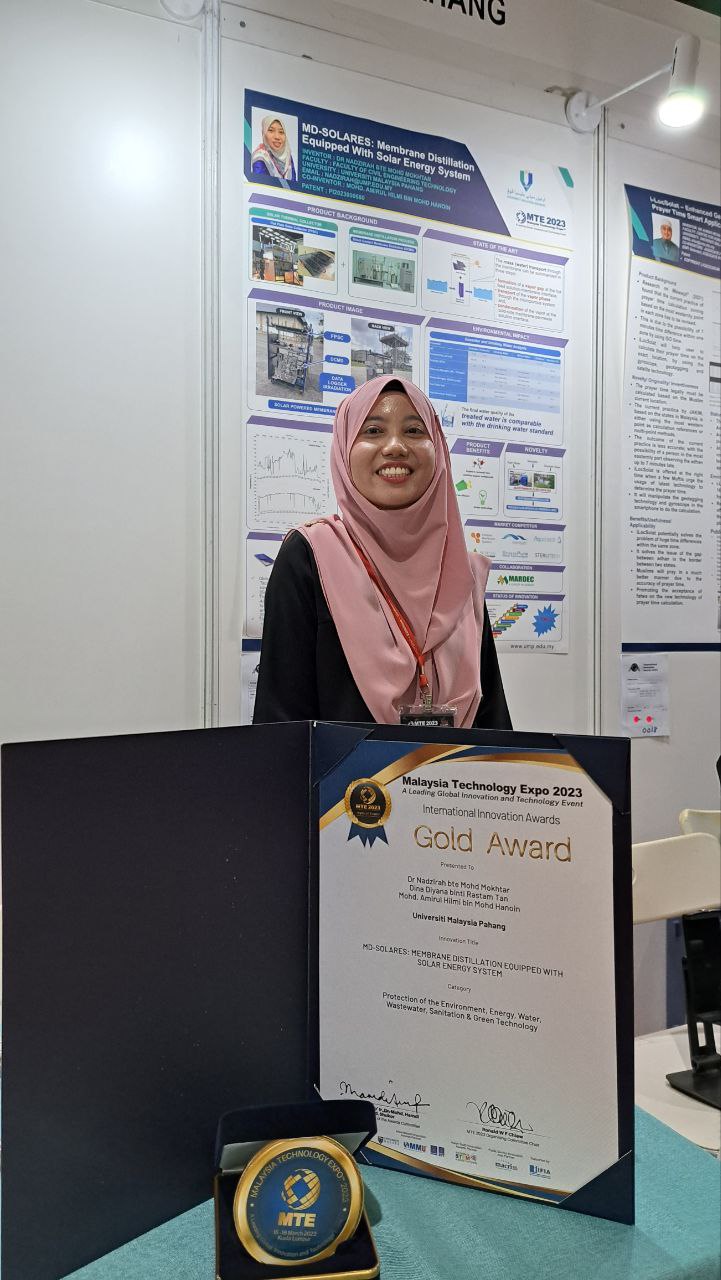Dr. Nadzirah creates MD-SOLARES: Solar Assisted Membrane Distillation System
GAMBANG, 1 January 2024 – MD-SOLARES or known as Membrane Distillation Equipped with Solar Energy System is a solar-assisted membrane distillation system created to solve the problem of difficulty in obtaining clean water supply in island and inland areas.
This product can also be used for wastewater treatment in industries such as rubber mills, palm oil mills, textile mills, food mills, and others.
The research output by Dr. Nadzirah Mohd Mokhtar, 35, who is a lecturer from the Faculty of Civil Engineering Technology (FTKA), Universiti Malaysia Pahang Al-Sultan Abdullah (UMPSA), has proven that the treated water is clean and has achieved high water quality after being used for seawater desalination.
According to Dr. Nadzirah, this research was started in 2017 and completed in 2019.
“However, this research is still being conducted to test the water quality for different industries using different types of membranes.
“The membrane distillation process using solar technology is the process of separating solutions through a distillation process involving a water treatment process that occurs by producing water vapour from a hot feed solution to a cold water solution through a separating membrane.
“This process occurs due to the temperature difference between the two solutions,” she said.
She added that the result is clean water that passes through the membrane while the rest of the foreign matter will return to the feed water tank.

“The electrical energy needed to heat the feed water uses fully homemade solar technology, which is a flat plate solar collector system.
“Initially, this membrane distillation system was fully operational using electricity from the main grid.
“Considering the issue of difficulty in obtaining electricity supply in the island and inland areas, the idea to produce MD-SOLARES is an innovation for a membrane distillation system combined with solar technology made by UMPSA students, namely Mohd. Amirul Hilmi Mohd Hanoin,” she said.
According to her, the system has helped reduce electricity consumption and encourage local innovation products using more environmentally friendly solar technology.
“This study was carried out with Dr. Rosmawati Naim from the Faculty of Chemical and Process Engineering Technology with technical staff, Ts. Joharizal Johari and Mohd Anuar Haji Ramli from the Centre for Design and Innovation of Technology as well as Mohd Shamsul Azmi Samsudin and Mohd Azlan Sayuti from the Faculty of Electrical and Electronic Engineering Technology.
“In addition, postgraduate students Mohd Amirul Hilmi Mohd Hanoin and Nor Amirah Safiah Muhamad from the Faculty of Civil Engineering Technology participated in this study.
“The end goal of this research is to commercialise this product for the production of drinking water from seawater and also use it for industrial wastewater treatment,” she said.
She said the results of the latest study succeeded in producing clean water quality from nearby industrial wastewater, but additional studies are still needed to test the durability of the system before it is fully used in the industry or community and to design processes for large-scale production.
This research is a direct collaboration conducted with the Mardec Mentakab rubber factory (MR4) Processing Sdn. Bhd. and palm oil mill FGV Palm Industries Sdn. Bhd., Lepar Hilir for wastewater sampling to conduct research under international research grant, FRGS and RDU UMPSA.
This product successfully received funding from the Kurita Water and Environment Foundation (KWEF), Japan to carry out water treatment from rubber plant processing waste.

Previously, this research received a gold medal at Malaysia Technology Expo 2023, and Best of the Best (Staff Category), Best Invention in Fluid Awards & Gold Medal in Creation, Innovation, Technology & Research Exposition (CITREX) UMPSA in 2022.
She hopes that MD-SOLARES can be used to solve the problem of a clean water supply in Malaysia and that this system can also be applied in the industry to replace existing industrial wastewater treatment plants.
“The next plan is to design a product that is more compact, low cost, easy to use and durable.
“We also plan to expand this function in the future by fully utilising solar technology and integrating the MD-SOLARES system with the internet of things (IoT) so that the system can be operated and controlled virtually using IR 4.0 technology,” she said.
Prior to the production of this product, Dr. Nadzirah also conducted research on a membrane distillation system without solar technology, MDSolution, and this product was her first product.
- 83 views










